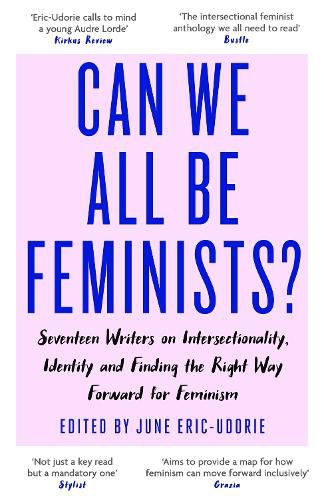Readings Newsletter
Become a Readings Member to make your shopping experience even easier.
Sign in or sign up for free!
You’re not far away from qualifying for FREE standard shipping within Australia
You’ve qualified for FREE standard shipping within Australia
The cart is loading…






The intersectional feminist anthology we all need to read (Bustle), edited by a remarkable and inspiring twenty-year-old activist who the BBC named one of 100 inspirational and influential women of 2016.
‘Not just a key read but a mandatory one’ Stylist September Top Ten Books
Why is it difficult for so many women to fully identify with the word feminist ? How do our personal histories and identities affect our relationship to feminism? Why is intersectionality so important? Can a feminist movement that doesn’t take other identities like race, religion, or socioeconomic class into account even be considered feminism? How can we make feminism more inclusive?
In CAN WE ALL THE FEMINISTS?, seventeen established and emerging writers from diverse backgrounds wrestle with these questions, exploring what feminism means to them in the context of their other identities-from a hijab-wearing Muslim to a disability rights activist to a body-positive performance artist to a transgender journalist. Edited by the brilliant, galvanizing, and dazzlingly precocious nineteen-year-old feminist activist and writer June Eric-Udorie, this impassioned, thought-provoking collection showcases the marginalized women whose voices are so often drowned out and offers a vision for a new, comprehensive feminism that is truly for all.
Including essays by: Soofiya Andry, Gabrielle Bellot, Caitlin Cruz, Nicole Dennis-Benn, Brit Bennett, Evette Dionne, Aisha Gani, Afua Hirsch, Juliet Jacques, Wei Ming Kam, Mariya Karimjee, Eishar Kaur, Emer O'Toole, Frances Ryan, Zoe Samudzi, Charlotte Shane, and Selina Thompson.
‘Amid debates about the direction of the modern feminist movement, CAN WE ALL BE FEMINISTS?, edited by June Eric-Udorie, presents new writing from 17 women on finding the right way forward, taking into account the intersections between different forms of prejudice.’ Laura Bates, Guardian
$9.00 standard shipping within Australia
FREE standard shipping within Australia for orders over $100.00
Express & International shipping calculated at checkout
The intersectional feminist anthology we all need to read (Bustle), edited by a remarkable and inspiring twenty-year-old activist who the BBC named one of 100 inspirational and influential women of 2016.
‘Not just a key read but a mandatory one’ Stylist September Top Ten Books
Why is it difficult for so many women to fully identify with the word feminist ? How do our personal histories and identities affect our relationship to feminism? Why is intersectionality so important? Can a feminist movement that doesn’t take other identities like race, religion, or socioeconomic class into account even be considered feminism? How can we make feminism more inclusive?
In CAN WE ALL THE FEMINISTS?, seventeen established and emerging writers from diverse backgrounds wrestle with these questions, exploring what feminism means to them in the context of their other identities-from a hijab-wearing Muslim to a disability rights activist to a body-positive performance artist to a transgender journalist. Edited by the brilliant, galvanizing, and dazzlingly precocious nineteen-year-old feminist activist and writer June Eric-Udorie, this impassioned, thought-provoking collection showcases the marginalized women whose voices are so often drowned out and offers a vision for a new, comprehensive feminism that is truly for all.
Including essays by: Soofiya Andry, Gabrielle Bellot, Caitlin Cruz, Nicole Dennis-Benn, Brit Bennett, Evette Dionne, Aisha Gani, Afua Hirsch, Juliet Jacques, Wei Ming Kam, Mariya Karimjee, Eishar Kaur, Emer O'Toole, Frances Ryan, Zoe Samudzi, Charlotte Shane, and Selina Thompson.
‘Amid debates about the direction of the modern feminist movement, CAN WE ALL BE FEMINISTS?, edited by June Eric-Udorie, presents new writing from 17 women on finding the right way forward, taking into account the intersections between different forms of prejudice.’ Laura Bates, Guardian